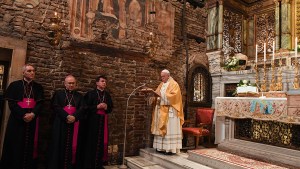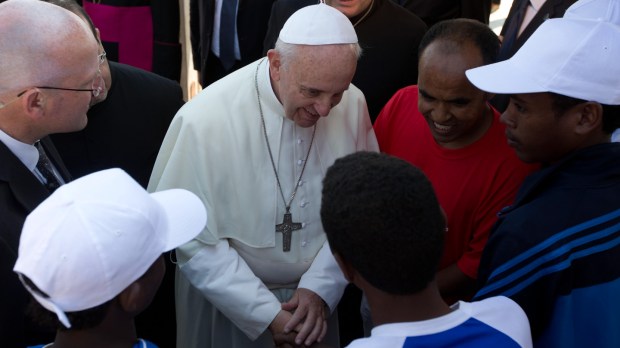It is possible to see Christ’s face, to look into his eyes, just as the Apostles did, Pope Francis assured on Wednesday at a Mass celebrated in the Casa Santa Marta.
This kind of personal encounter with Jesus Christ is possible also for us, who are the disciples of the third millennium. In our effort to seek the Lord’s face, we can recognise him in the face of the poor, the sick, the abandoned, and the foreigners whom God places on our way.
The pope celebrated the Mass to commemorate the seventh anniversary of his visit to the Italian island of Lampedusa.
The July 8, 2013, visit of the pope to the Mediterranean island was the first of his pontificate after his election on 13 March of the same year. During the visit, he threw a floral wreath in the sea in memory of some 20,000 migrants who died while trying to cross the Mediterranean. He briefly met and spoke to some young African migrants before celebrating an open-air Mass.
~
Read an 11-part series recounting the experience of an American college professor and his experience with the refugees in Lesbos.

Read more:
Leaving Lesbos: I have walked a mile in the sandals of a refugee
Here is a Vatican translation of Pope Francis’ homily today:
The Responsorial Psalm invites us always to seek the Lord’s face: “Seek the Lord and his strength; seek his presence continually” (Ps 105:4). This quest is fundamental for the life of every believer, for we have come to realise that our ultimate goal in life is the encounter with God.
To seek the face of God is an assurance that our journey through this world will end well. It is an exodus towards the Promised Land, our heavenly home. The face of God is our destination and the guiding star that helps us not to lose our way.
The people of Israel, as described by the prophet Hosea in the first reading (cf. 10:1-3.7-8.12), had gone astray. They had lost sight of the Promised Land and were wandering in the desert of iniquity. Abundance, prosperity and wealth had caused their hearts to drift away from the Lord and had filled them instead with falsehood and injustice.
We too, as Christians today, are not immune to this sin. “The culture of comfort, which makes us think only of ourselves, makes us insensitive to the cries of other people, makes us live in soap bubbles which, however lovely, are insubstantial; they offer a fleeting and empty illusion which results in indifference to others; indeed, it even leads to the globalisation of indifference. In this globalised world, we have fallen into globalised indifference. We have become used to the suffering of others: it doesn’t affect me; it doesn’t concern me; it’s none of my business!” (Homily in Lampedusa, 8 July 2013).
In this globalised world, we have fallen into globalised indifference.
Hosea’s words reach us today as a renewed summons to conversion, a call to turn our eyes to the Lord and recognise his face. The prophet says: “Sow for yourselves righteousness; reap steadfast love; break up your fallow ground, for it is time to seek the Lord, that he may come and rain righteousness upon you” (10:12).
Our efforts to seek the face of God are born of the desire for an encounter with the Lord, a personal encounter, an encounter with his immense love, with his saving power. The twelve apostles described in today’s Gospel (cf. Mt 10:1-7) received the grace to encounter him physically in Jesus Christ, the incarnate Son of God. Jesus – as we heard – called each of them by name. He looked them in the eye, and they in turn gazed at his face, listened to his voice and beheld his miracles. The personal encounter with the Lord, a time of grace and salvation, entails a mission: “As you go”, Jesus tells them, proclaim the good news: ‘The kingdom of heaven is at hand’” (v. 7). Encounter and mission must not be separated.
This kind of personal encounter with Jesus Christ is possible also for us, who are the disciples of the third millennium. In our effort to seek the Lord’s face, we can recognise him in the face of the poor, the sick, the abandoned, and the foreigners whom God places on our way. This encounter becomes also for us a time of grace and salvation, and summons us to the same mission entrusted to the Apostles.
Today marks the seventh year, the seventh anniversary of my visit to Lampedusa. In the light of God’s word, I would like to repeat what I said to those taking part in the meeting “Free from Fear” in February last year: “The encounter with the other is also an encounter with Christ. He himself told us this. He is the one knocking on our door, hungry, thirsty, naked, sick, imprisoned; he is the one seeking an encounter with us, asking our help, asking to come ashore. And lest we have any doubt, he tells us categorically: ‘Truly I tell you, whatever you did to one of the least of these my brethren, you did to me’” (Mt 25:40).
“Whatever you did…” for better or for worse! This admonition is all the more timely today. We ought to use it as a basic starting point for our daily examination of conscience. Here I think of Libya, detention camps, the abuses and violence to which migrants are subjected; I think of journeys of hope, rescue operations, and cases of rejection. “Whatever you did… you did to me.”
They gave me the “distilled” version. This is what is happening today with Libya: they are giving us a “distilled version”.
I remember that day, seven years ago, in the very south of Europe, on that island… A number of people told me their stories and all that they had gone through to get there. There were interpreters present. One person was telling me about terrible things in his language, and the interpreter seemed to translate well, but this person spoke so long and the translation was brief. “Well”, I thought, “their language must require more words to express an idea”. When I returned home that afternoon, in the reception area there was a lady – God bless her, she has since passed away – who was a daughter of Ethiopians. She understood the language and she had seen our conversation on television. She said this to me. “Listen, what the Ethiopian translator told you is not even a quarter of the torture and suffering that those people experienced”. They gave me the “distilled” version. This is what is happening today with Libya: they are giving us a “distilled version”. The war is indeed horrible, we know that, but you cannot imagine the hell that people are living there, in that detention camp. And those people came only with hope of crossing the sea.
May the Virgin Mary, Solacium migrantium, “Solace of Migrants”, help us discover the face of her Son in all our brothers and sisters forced to flee their homeland because of the many injustices that continue to afflict our world.

Read more:
Pope adds ‘Mother of Hope’ to Litany of Mary, along with two other new titles

